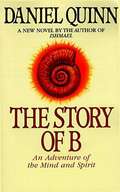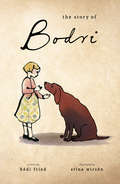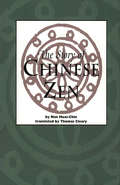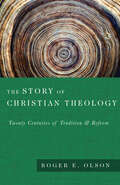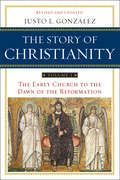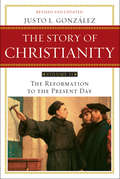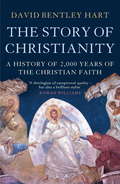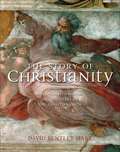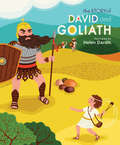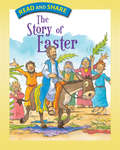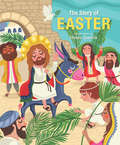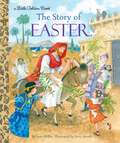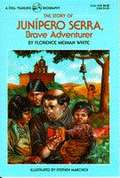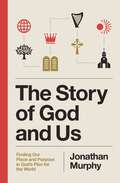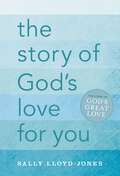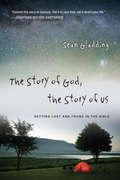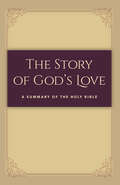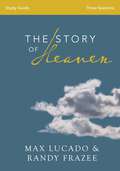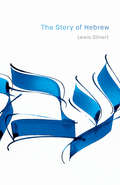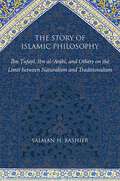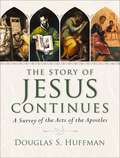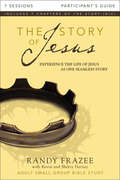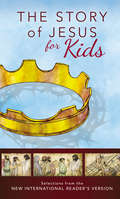- Table View
- List View
The Story of B (Ishmael Series #2)
by Daniel QuinnThe Story of B combines Daniel Quinn's provocative and visionary ideas with a masterfully plotted story of adventure and suspense in this stunning, resonant novel that is sure to stay with readers long after they have finished the last page. Father Jared Osborne--bound by a centuries-old mandate held by his order to know before all others that the Antichrist is among us--is sent to Europe on a mission to find a peripatetic preacher whose radical message is attracting a growing circle of followers. The target of Osborne's investigation is an American known only as B. He isn't teaching New Age platitudes or building a fanatical following; instead, he is quietly uncovering the hidden history of our planet, redefining the fall of man, and retracing a path of human spirituality that extends millions of years into the past. From the beginning, Fr. Osborne is stunned, outraged, and awed by the simplicity and profundity of B's teachings. Is B merely a heretic--or is he the Antichrist sent to seduce humanity not with wickedness, but with ideas more alluring than those of traditional religion? With surprising twists and fascinating characters, The Story of B answers this question as it sends readers on an intellectual journey that will forever change the way they view spirituality, human history, and, indeed, the state of our present world.From the Trade Paperback edition.
The Story of Bodri
by Hédi FriedHédi spends her days playing with her dog Bodri in the park, but her quiet world starts to crumble the day she hears Adolf Hitler on the radio. Germany&’s leader hates her and her family, just because they are Jewish. And Hitler doesn&’t even know them—it doesn&’t make any sense. Soon Nazi Germany invades Hédi&’s country, and her life changes forever.Inspired by the author&’s experiences, this book is a thoughtful introduction to the Holocaust for young readers. Strikingly honest prose and illustrations share an unforgettable story about a faithful dog, a family in danger, and the power of hope in unimaginable circumstances.
The Story of Chinese Zen
by Thomas Cleary Nan Huai-ChinThe development of Zen in China is really the story of the flourishing of Chinese philosophy, arts and literature beginning as far back as the Han Dynasty and earlier. Master Nan Huai-Chin offers an engaging chronicle of both in this groundbreaking work.
The Story of Chinese Zen
by Thomas Cleary Nan Huai-ChinThe development of Zen in China is really the story of the flourishing of Chinese philosophy, arts and literature beginning as far back as the Han Dynasty and earlier. Master Nan Huai-Chin offers an engaging chronicle of both in this groundbreaking work.
The Story of Christian Theology: Twenty Centuries of Tradition Reform
by Roger E. OlsonVoted a 2000 Book of the Year by Christianity TodayWinner of a year 2000 ECPA Gold Medallion Award History is made up of stories--narratives that recount the events, movements, ideas and lives that have shaped religions and nations. Theologian Roger Olson believes that the history of Christian theology should be told as such a story, one replete with thick plots, exciting twists, interesting people and fascinating ideas. In this panoramic work of historical theology Olson vividly recounts the deeds and words of the cultists and apostolic fathers of the second century, the clash between the theological schools of Alexandria and Antioch, the epochal division between East and West, the revolutionary advent of the Reformation and much more, right on up to the dazzling, sometimes dismaying fallout that has continued to shake Christians through the twentieth century. Through it all Olson detects and traces a common thread: a concern for salvation--God's redemptive activity in forgiving and transforming sinful human beings. Evenhanded, refreshingly readable, impressive in its breadth and depth, The Story of Christian Theology is poised to become a standard historical theology text.
The Story of Christianity, Volume I: The Early Church to the Dawn of the Reformation (The Story of Christianity #1)
by Justo L. GonzálezIn this fully revised and updated edition, the lauded church historian Justo González tells the story of Christianity from its fragile infancy to its pervasive dominance at the dawn of the Protestant Reformation. The Story of Christianity, volume 1, relates the dramatic events, the colorful characters, and the revolutionary ideas that shaped the first fifteen centuries of the church's life and thought.<P> From Jesus's faithful apostles to the early reformist John Wycliffe, González skillfully weaves details from the lives of prominent figures tracing core theological issues and developments within the various traditions of the church. The Story of Christianity demonstrates at each point what new challenges and opportunities faced the church and how Christians struggled with the various options open to them, thereby shaping the future direction of the church.<P> This new edition of The Story of Christianity incorporates recent archaeological discoveries to give us a better view of the early Christian communities. Among these are advances in the recovery of Gnostic texts that have revealed a richer diversity of "Christianities" in the first century. González also includes important research done in the past twenty-five years revealing the significant role of women throughout the history of the church. <P> With lively storytelling incorporating the latest research, The Story of Christianity provides a fascinating introduction to the panoramic history of Christianity.
The Story of Christianity, Volume II: The Reformation to the Present Day (The Story of Christianity #2)
by Justo L. GonzálezBeginning with the Protestant Reformation of the sixteenth century, this fully revised and updated second volume of The Story of Christianity continues the marvelous history of the world's largest religion. Award-winning historian Justo Gonzalez bring to life the people, dramatic events, and theological debates that have shaped Protestantism, Catholicism, and Orthodoxy. From the monk Martin Luther, who dared to stand up to a corrupt pope, to the surprising spread and growing vitality of today's church in Africa, Asia, and South America, The Story of Christianity offers a complete and up-to-date retelling of this amazing history.<P> With new information on the important contributions of women to church history as well as the latest information on Christianity in developing countries, Gonzalez's richly textured study discusses the changes and directions of the church up to the twenty-first century. The Story of Christianity covers such recent occurrences as the fall of the Soviet Union and the return of the Russian Orthodox Church; feminist, Africa-American, and Third-World theologies; the scandals and controversies facing the reign of Pope Benedict XVI; interfaith dialogue; and the movement toward unity of all Christian churches. This revised and updated edition of The Story of Christianity concludes with a thoughtful look at the major issues and debates facing Christianity today.
The Story of Christianity: An Illustrated History Of 2000 Years Of The Christian Faith
by David Bentley HartIn The Story of Christianity, acclaimed theologian David Bentley Hart provides a sweeping and informative portrait of a faith that has shaped the western world and beyond for over 2,000 years. From the persecutions of the early church to the papal-imperial conflicts of the Middle Ages, from the religious wars of 16th- and 17th-century Europe to the challenges of science and secularism in the modern era, and from the ancient Christian communities of Africa and Asia to the 'house churches' of contemporary China, The Story of Christianity triumphantly captures the complexity and diversity of Christian history.
The Story of Christianity: An Illustrated History Of 2000 Years Of The Christian Faith
by David Bentley HartIn The Story of Christianity, acclaimed theologian David Bentley Hart provides a sweeping and informative portrait of a faith that has shaped the western world and beyond for over 2,000 years. From the persecutions of the early church to the papal-imperial conflicts of the Middle Ages, from the religious wars of 16th- and 17th-century Europe to the challenges of science and secularism in the modern era, and from the ancient Christian communities of Africa and Asia to the 'house churches' of contemporary China, The Story of Christianity triumphantly captures the complexity and diversity of Christian history.
The Story of Christianity: An Illustrated History of 2000 Years of the Christian Faith
by David Bentley HartIncludes timelines, display quotations, and profiles of the key personalities who shaped the course of the history of the Christian faith.
The Story of David and Goliath
by Running Press Helen DardikA classic tale of bravery and faith in this inspiring retelling of a timeless Bible story.A long time ago, there was a giant named Goliath, who even the toughest soldiers were afraid to fight. But one young boy, David, was very brave, and he found the courage to stand up to Goliath. Armed with only his slingshot and his faith in God, David defeated Goliath and brought peace to his people. Share the classic, remarkable tale of David and Goliath with young ones in the third book of this delightful series. With stunning art by Helen Dardik and simplified text for little readers, The Story of David and Goliath is sure to become a perennial favorite for families.
The Story of Easter
by Gwen EllisFrom the Read and Share Bible brand, this retelling of the Easter story is explained in a way that helps young children understand the life, death, burial, and resurrection of Jesus. The story of Christ's last week is carefully told in a way that teaches children about the amazing gift Jesus gave us. Events include His triumphant entry into Jerusalem on Palm Sunday through His appearance to the disciples and His ascension.
The Story of Easter
by Helen DardikCelebrate the story of Easter in this beautifully illustrated retelling of a classic Bible tale. God's love for his followers culminates in the Easter story, beginning with Jesus's last supper with his disciples and ending with his ascension into Heaven. Jesus's love and faith in God is unshaken in this story of his death and resurrection, and his promise of everlasting life is finally fulfilled.Share the classic, powerful Easter story with young ones in the fourth book of this delightful series. With stunning art by Helen Dardik and simplified text for little readers, The Story of Easter is sure to become a perennial favorite for families.
The Story of Easter (Little Golden Book)
by Jean MillerThis Little Golden Book retelling of the Easter story is the perfect gift for children to learn true meaning of the holiday!This gentle introduction to the biblical account of Jesus's final days on earth, and Resurrection, is perfect for preschoolers. Lush, colorful illustrations of the Last Supper, Jesus carrying his cross, and the angel in the empty tomb are accessible to little readers who are just learning about Easter. At the end of the book, Easter traditions from around the world are introduced, from Ukrainian painted eggs (Pysanky) to the greeting of the Easter sunrise in the British Isles. It's a perfect first book about an important holiday for many, and an ideal Easter gift."
The Story of Father Junípero Serra, Brave Adventurer
by Florence Meiman WhiteFather Junípero Serra journeyed thousands of miles across the sea, over high mountains, through hot deserts and frightening jungles--from Spain to Mexico to California. This dedicated and determined missionary was one of California's first settlers, and it was he who founded its first nine missions and devoted his life to working with the Indians.
The Story of God and Us: Finding Our Place and Purpose in God's Plan for the World
by Jonathan MurphyPastor and author Jonathan Murphy provides readers with a framework—a master plot—to the story of all history. This deep exploration of Scripture reveals that God is in complete command of this universe and how He guides everyone's story: past, present, and future.Good stories make you laugh, cry, fear, dream, hope. They engage our hearts, entertain our minds, and enlighten our souls. God wrote a story—the best story ever!—full of drama, adventure, love, sacrifice, redemption, and has an ending that seems too good to be true. And the greatest thing about God's story is that we are all part of it. His story provides the meaning of life that brings fulfillment of our desires and purpose for our existence.The Story of God and Us shows not only what God is doing from creation to eternity, but how everything makes sense as you read the Bible from the beginning of Genesis to the end of Revelation. World history is not made up of random people and events but of divine appointment and purpose. In this book, Jonathan Murphy leads readers to understand how:the meaning of life is essential to a fulfilling relationship and partnership with God;God accomplishes His plans in a pleasing and connecting way;a multidimensional view of Scripture can engage and delight even the most disinterested and distracted; andseeing the big picture can provide a fresh look at how our story clearly fits into God's. As Jonathan retells God's story through a fresh lens, Christians will better understand how much God loves them, how He desires us to live with Him and for Him, and why we should invite others into this amazing story every chance that we get!
The Story of God's Love for You: Every Story Whispers His Name (Jesus Storybook Bible Ser.)
by Sally Lloyd-JonesIt&’s an adventure story about a young Hero who comes from a far country to win back his lost treasure. It&’s a love story about a brave Prince who leaves his palace, his throne—everything—to rescue the one he loves. The best thing about this Story is—it&’s true! And at the center of the Story, there is a baby. The Child upon whom everything would depend.All the stars, mountains, oceans, and galaxies were nothing compared to how much God loved his children. He would move heaven and earth to be near them. Always. Whatever happened, whatever it cost him, he would always love them. And so it was that the wonderful love story began.The Story of God&’s Love for You:Is for teenagers and adults who want to read and learn about the story of God&’s love for themIncludes 44 short chapters that lead you through the beautiful story of the Bible—Genesis to RevelationMasterfully shows how all the individual Bible stories fit together into one cohesive narrative that points to JesusMakes the big picture of Scripture clear to new believers, and helps seasoned believers fall in love with the Bible all over againFeatures text from bestselling author Sally Lloyd-Jones that brings the truths of the Bible into a new light for today&’s worldThe beauty and peace that only God&’s love can provide pulses through every page. Just as The Jesus Storybook Bible is an essential book for the library of every child, The Story of God&’s Love for You is an essential book for the library of every adolescent and adult.
The Story of God, the Story of Us: Getting Lost and Found in the Bible (Forge Partnership Bks.)
by Sean Gladding"The ever present ache of exile rises above the comforting sounds of the river, as the image of the house of the LORD in ruins breaks the peace. . . . Despite the warmth of the fire, he feels a chill. He wraps his cloak around him and looks into the eager faces of his people, then closes his eyes. 'Picture this scene . . .'" Before the Bible was a book, it was flesh and blood. In this book, you can travel with Sean Gladding between the lines of the Scriptures to listen in on the conversations of people wrestling with the Story of God for the first time. Whether sitting around a campfire in Babylon, reclining at table in Asia Minor or huddled together by candlelight in Rome, you'll encounter a tale that is at once familiar and surprising. The Story of God, the Story of Us can be read alone but is especially rich shared with a group. Sean Gladding presents an account of the Bible that pays attention to its audience as well as its message. He introduces you to people who may remind you of yourself or your family, friends and coworkers. As much as the Bible is a story about God, it's also a story about you--and all of us--as we encounter God in a new way.
The Story of God’s Love: A Summary of the Holy Bible eBook
by Aaron JensenThis abridged edition of the Holy Bible: Evangelical Heritage Version (EHV) will help you see the full picture of God's love and plan of salvation for humanity. The Bible is— at its heart— the grand and beautiful story of God' s love for you. It shows how sin separates you from God, and reveals what God has done to restore that broken relationship with you: He sent his Son, Jesus to save you and all people from sin. Drawn directly from the EHV text, the accounts in The Story of God's Love are presented without chapter or verse numbers for smooth, continuous reading. In this book, you'll find: • 250 Bible readings selected from all 66 books of the Bible— from Genesis to Revelations— including 175 of the most significant Bible stories • Brief summaries at the beginning of each reading section • Prayers at the end of each reading section • 13 Bible history timelines• Six maps of Bible lands The Story of God's Love is great for first-time Bible readers who want a brief summary of the Bible, making it a great resource for veteran Bible readers to go through together with a family member or friend!
The Story of Heaven Study Guide: Exploring the Hope and Promise of Eternity
by Max Lucado Randy FrazeeThe Story of Heaven small group video Bible study is a three-week exploration into the hope and promise of Heaven, adapted from God’s Story, Your Story and The Story Adult Curriculum. Pulled straight from the pages of the Bible, this study provides individuals and groups of all sizes the opportunity to learn, discuss, and apply biblical teaching about heaven to their everyday lives. These three video sessions will open your eyes to the glorious finale of God's masterfully-told story. Discover the heart of God's Story and the joy that comes as you align your story with God's. This Participant’s Guide is designed for use with The Story of God DVD (sold separately) which can be utilized by individuals as well as groups of all sizes, including small groups and Sunday school and adult education classes. SESSIONS Session 1: “Your Final Chapter Becomes a Preface” (Lucado) Session 2: “You Will Finally Graduate” (Lucado) Session 3: “The End of Time” (Frazee) Max Lucado and Randy Frazee offer a hope-filled perspective of heaven, showing groups: • The power of the words “Christ has risen” and the hope that they provide • How Jesus promises this same type of resurrection to those who follow Him • The promise of new bodies without sickness and without the struggles of the flesh • A picture of what the kingdom of God will be like from the book of Revelation How we can participate in God’s ultimate story • How Jesus will return to earth and live with us in a new earth forever
The Story of Hebrew (Library of Jewish Ideas)
by Lewis GlinertThis book explores the extraordinary hold that Hebrew has had on Jews and Christians, who have invested it with a symbolic power far beyond that of any other language in history. Preserved by the Jews across two millennia, Hebrew endured long after it ceased to be a mother tongue, resulting in one of the most intense textual cultures ever known. It was a bridge to Greek and Arab science. It unlocked the biblical sources for Jerome and the Reformation. Kabbalists and humanists sought philosophical truth in it, and Colonial Americans used it to shape their own Israelite political identity. Today, it is the first language of millions of Israelis.The Story of Hebrew takes readers from the opening verses of Genesis—which seemingly describe the creation of Hebrew itself—to the reincarnation of Hebrew as the everyday language of the Jewish state. Lewis Glinert explains the uses and meanings of Hebrew in ancient Israel and its role as a medium for wisdom and prayer. He describes the early rabbis' preservation of Hebrew following the Babylonian exile, the challenges posed by Arabic, and the prolific use of Hebrew in Diaspora art, spirituality, and science. Glinert looks at the conflicted relationship Christians had with Hebrew from the Renaissance to the Counter-Reformation, the language's fatal rivalry with Yiddish, the dreamers and schemers that made modern Hebrew a reality, and how a lost pre-Holocaust textual ethos is being renewed today by Orthodox Jews.A major work of scholarship, The Story of Hebrew is an unforgettable account of what one language has meant to those possessing it.
The Story of Islamic Philosophy: Ibn Ṭufayl, Ibn al-ʿArabī, and Others on the Limit between Naturalism and Traditionalism
by Salman H. BashierIn this innovative work, Salman H. Bashier challenges traditional views of Islamic philosophy. While Islamic thought from the crucial medieval period is often depicted as a rationalistic elaboration on Aristotelian philosophy and an attempt to reconcile it with the Muslim religion, Bashier puts equal emphasis on the influence of Plato's philosophical mysticism. This shift encourages a new reading of Islamic intellectual tradition, one in which boundaries between philosophy, religion, mysticism, and myth are relaxed. Bashier shows the manner in which medieval Islamic philosophers reflected on the relation between philosophy and religion as a problem that is intrinsic to philosophy and shows how their deliberations had the effect of redefining the very limits of their philosophical thought. The problems of the origin of human beings, human language, and the world in Islamic philosophy are discussed. Bashier highlights the importance of Ibn Ṭufayl's Ḥayy ibn Yaqẓān, a landmark work often overlooked by scholars, and the thought of the great Sufi mystic Ibn al-ʿArabī to the mainstream of Islamic philosophy.
The Story of Jesus Continues: A Survey of the Acts of the Apostles
by Douglas S. HuffmanA unique introduction to the Acts of the Apostles, focusing on the book of Acts as an extension of the Jesus story.With full-color photographs, maps, and sidebars about history, ancient literature, and archaeological finds,?Douglas Huffman takes readers through different introductory and interpretive issues in the study of Acts, including the genre, purpose, history, culture, and geographical setting of the story.Equipped with these behind-the-scenes details, in broad strokes the author traces Luke's well-told recounting of the ongoing story of Jesus. Sensitive to the purposes Luke had for his text - as well as its connection to the Gospel of Luke - Huffman concludes by demonstrating how the Jesus story is intended to continue into the present.Specifically designed as a textbook, the volume includes chapter overviews and summaries discussion questions and assignments, lists of key terms, and a glossary.
The Story of Jesus Participant's Guide: Experience the Life of Jesus as One Seamless Story
by Randy Frazee Kevin HarneyThe Story of Jesus Bible study is a seven-session exploration into the life and ministry of Jesus. Pulled straight from the pages of the Bible, this study provides individuals and groups of all sizes the opportunity to learn, discuss, and apply Jesus’ life, work, and teaching to their everyday lives. Pastor and author Randy Frazee teaches how the story of Jesus intersects with the story of our modern day lives. Designed for use with the video.
The Story of Jesus for Kids, NIrV
by ZondervanThis is a small, softcover booklet with a big message. The Story of Jesus for Kids uses the clear, accessible language of the New International Reader's Version (NIrV) to tell the story of the most significant person who ever lived. Compelling and powerful, it’s also a compact, low-priced way to share the Jesus story in one seamless narrative. The Story of Jesus for Kids is one book that will be read again and again.
